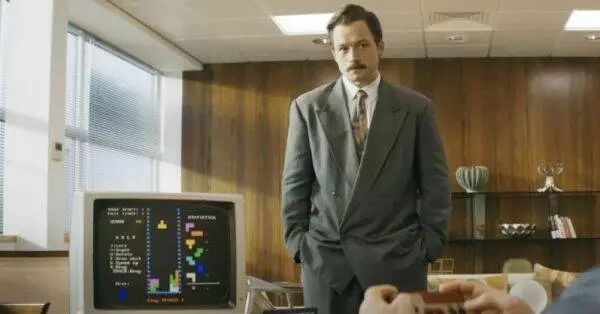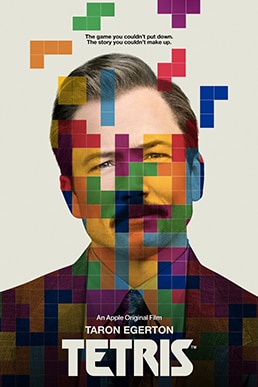Eye For Film >> Movies >> Tetris (2023) Film Review
Tetris
Reviewed by: Andrew Robertson

If, like me, you happen to own a copy of David Sheff's book Game Over* then you may already know some of the somewhat improbable story of how Nintendo came to bundle Tetris with the Gameboy. There are all sorts of tales associated, including that George Bush senior was seen playing during his Presidency in recovery from a medical procedure. Roughly two chapters, an eighth (so more than a bite) of that book are devoted to the acquisition (and retention) of the rights to publish the game. While the real story is, if anything, even more complicated, it also lacks a chase sequence.
Taran Egerton plays Henk Rogers, the director of Bullet-Proof Software. You might recognise that name depending on your vintage, I can picture it in the pixel letters of a Gameboy Screen without thinking too hard about it. That there was a complicated story behind a title screen that said "TM and (C) 1987 ELORG, Tetris Licensed To Bullet-Proof Software and sub-licensed to Nintendo" wasn't the kind of thing one thought about. It was a bit of text on the way to trying to beat a younger sibling's high score.
It's also, more or less, inspiration for the film. It does simplify the story quite a bit, heightens a few things for comic effect, makes quite a bit more of Robert Maxwell (Roger Allam) and even more of various apparatchiks within the Soviet state. It changes some of the order of awareness and removes a fair few folk. It has real details like the use of square brackets in earlier non-graphical versions to draw the blocks, and simplifies some things for modern audience understanding. They didn't install a program to block it from work computers to restore productivity, a manager went from desk to desk and destroyed the floppies. To understand why that would have worked you'd probably need to go through loading and operating and nobody would want to try and lift themselves by those bootlaces.
Broderbund and, more importantly, Spectrum Holobyte are completely cut out, and there's a further reduction in that TELEX machines become fax machines. Elsewhere in simplification the split between Tengen and Atari is removed, and for a plot that relies in part on definitions of computers the delineations of various platforms aren't always made clear. There's no mention of the Sharp X68000 or many other platforms. It's not even worth getting into how various versions of Tetris seen don't quite match or are anachronistic because despite being based on a true story the film is more in the vein of Argo or Air than anything else.
Egerton fulfils a role that a decade or more ago would probably have gone to an Affleck or a Damon, and maybe a decade before that to Clooney, and a decade before that to Hanks, and so on back through decades of charismatic leading men who could probably manage a moustache. Around him a string of English character actors, Allam as mentioned, Toby Jones as Robert Stein who first brought Tetris West. Anthony Boyle's not there yet, but as Kevin "Mister to you" Maxwell he's an oleaginous chip off the unproven allegations block.
There's a part of me that really wants to give this four stars for the numerical alignment, but it falls short, doesn't quite hit the mark, feels incomplete. I know that's three too. It's got an Eighties style "what happened next" montage before the credits and that doesn't so much feel dated as another bit of period detail. That sites in Scotland had such an easy time doubling for Brutalist Moscow is as much because of exported architects as Aberdonian climate. The structure of it, with levels, Muppet style 'travelling by map', even, arguably, that its pace gets a bit faster in each segment might be a tribute to video games in general, but it might be more of Pixels than of Tron: Legacy.
Eye For Film saw a friends and family preview screening that might have been an unofficial UK première, and in it the producers and director Jon S Baird talked about how carefully lines involving the ultimate owner and his offspring at Mirrorsoft were shaped. Baird's comic chops are evident here, though a 15 rating is almost entirely a product of foul language rather than unfair play. He is fresh from Stonehouse on TV, Tetris is an Apple product (the film, not the, you know what, leave it) and so might count. Writer Noah Pink is one of the creators of National Geographic series Genius and penned 2017's This Is Your Death/The Show. High stakes around entertainment are therefore nothing new, but there are a lot of moving parts for what's only a second feature.
Architect of those moving parts is Nikita Efemov, as Alexey Pajitnov. He and Henk both have families, and while we meet them both and see the various threats to them it does seem that the relationships are just places where certain clichés will cause them to disappear. I was entertained, but unlike an actual game of Tetris I didn't want to go straight back to it. After seeing it, in fact, what I really wanted to do was play Tetris. One can play it for free at Tetris.com and you'll see legal entity Tetris Holding mentioned as well as Pajitnov. Placement of his name isn't quite as complicated as some of the jockeying in The Social Network but they both share protagonists willing to cross lines to get what they want.
One of the features 'modern' Tetris has, including the ludicrously competitive massively multiplayer Tetris-99, is the option to 'hold' a block. You can use it in desperation, taking a tetromino that'd otherwise be your undoing into reserve and having another start again at the top of the screen. You've still got to deal with it though, however advantageous it might have been going to be. Tetris holds a few details back, but it doesn't deploy them or their substitutes to much reward. One of the most notable things about Bullet-Proof's version of the game is that the controls are effectively inverted and make it hard to go back. That's possibly true of this version of the story as well.
There's a story (in Game Over) that in and amongst accusations of piracy and otherwise, when Minoru Arakawa (Ken Yamamura) visited ELORG they brought out a small box - "Our people made this" - "Inside was a Game & Watch that played Donkey Kong. There was no sign of Nintendo's name or trademark." That story is on p.326 of Game Over, as are many of the other details that made it to the film. What's not there, but is here, is the sense that Nintendo are the good guys.
The film comes out as Nintendo shut down the Wii U and 3DS eshops, meaning almost countless titles are now inaccessible. The film doesn't factor in the destruction of the (somewhat unauthorised) Tengen Tetris cartridges, which you can pick up for a few hundred dollars online. Destroying product is nothing entirely new. Funko are doing the same thing now with their collectibles due to over-production, and stories of the disastrous E.T. game are (in certain circles) something to phone home about.
The stakes come from a question as to whether they'd succeed. I'd wager that there are probably some who dispute the existence of Tetris, or argue that it was actually an attempt to damage Western productivity in the latter half of the Cold War, but those pale in comparison to the denials associated with First Man or anything featuring other US Presidents. The problem is that it might have seemed a gamble, but we know it paid off. In that respect it definitely shares traits with Air, and not just in the numbers of zeroes involved. We're getting more in this vein soon from projects like BlackBerry. Tetris may well fit into schedules neatly, and be exactly what folk are hoping for - for others the temptation may be to hold onto it, and see what else comes along.
Reviewed on: 30 Mar 2023

















